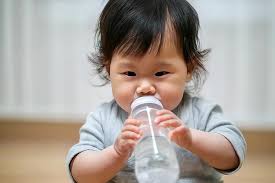
Hydration Tips for Babies in Different Seasons
Hydration is vital for babies’ health across all seasons, supporting growth, digestion, and temperature balance. While breast milk or formula fully hydrates infants under 6 months, older babies benefit from safe water and seasonal hydrating foods. Parents should adapt hydration strategies in summer, winter, and monsoon, watching for dehydration signs.
💪 Fitness Guru
41 min read · 23, Aug 2025

Introduction
Water is the foundation of life, and for babies, proper hydration is crucial for healthy growth and development. Babies have a higher water content in their bodies compared to adults, which means they are more sensitive to dehydration. Their small size, developing systems, and inability to express thirst make them especially vulnerable.
What makes hydration even more important is that babies’ needs change with the seasons. Whether it’s the scorching heat of summer, the dryness of winter, or the transition of spring and autumn, parents must adjust how they keep their little ones hydrated.
In this article, we’ll explore the importance of hydration for babies, the role of breast milk, age-specific guidelines, seasonal hydration tips, myths, and practical daily routines to ensure your baby stays healthy and comfortable all year long. Hydration is one of the most vital aspects of a baby’s overall health and well-being, yet it is often overlooked because parents assume that milk alone is enough. While breast milk or formula is indeed the primary source of fluids for infants, understanding how hydration needs shift with changing seasons is essential. Babies have delicate bodies that lose and retain water differently from adults, making them more vulnerable to dehydration, whether it’s the blazing heat of summer, the dry winds of winter, or the fluctuating conditions of monsoon. As parents, ensuring your baby remains well-hydrated throughout the year is not just about quenching thirst but about maintaining healthy growth, regulating body temperature, aiding digestion, and supporting brain development.
In the summer months, the risk of dehydration is at its peak. Babies sweat more due to the hot climate but cannot express thirst clearly, so parents need to be extra cautious. Breastfed infants typically get enough water through milk, but during extreme heat, they may demand feeds more frequently. Offering them short, more frequent feeds ensures they stay hydrated without overburdening their small stomachs. For babies above six months who have started solids, incorporating water-rich foods like watermelon, cucumber, and mashed fruits can be a gentle way of keeping their fluid levels up. At the same time, it’s important to dress them in breathable cotton clothes and keep them indoors during the hottest part of the day. Overexposure to heat not only risks dehydration but also heatstroke, which can be dangerous for infants. Parents should also watch out for subtle signs like fewer wet diapers, dry lips, and unusual irritability, as these often indicate dehydration in babies.
The rainy season presents a different set of challenges. While the climate is relatively cooler, humidity levels rise significantly, which can sometimes trick parents into believing hydration is not as important. However, excess humidity can lead to sweating and discomfort, making fluid loss just as real as in summer. Moreover, the rainy season often brings infections, diarrhea, and fevers, which can rapidly deplete a baby’s hydration levels. Ensuring they receive frequent breastfeeding or formula feeding remains key, and for older infants, warm soups, soft porridges, and mashed fruits can balance hydration with nutrition. Parents should be careful about water hygiene during monsoon, as contaminated water can cause gastrointestinal issues. Always boil and cool drinking water for older babies and sterilize feeding bottles properly to prevent the spread of germs.
Winter, though seemingly harmless when it comes to hydration, can be deceptively risky. Cold weather often suppresses thirst signals in babies, meaning they may not show outward signs of needing fluids. Additionally, indoor heating systems or dry winds can strip moisture from the skin and airways, leaving babies more prone to dehydration than most parents realize. Babies in winter may require slightly more frequent feeding sessions to ensure they’re consuming enough fluids. For those over six months, including warm liquids like vegetable broth, light lentil soups, and pureed fruits can keep hydration balanced while providing comfort against the chill. Skin hydration also plays a vital role in this season, so gentle moisturizers and keeping babies away from excessively dry air are important. Parents should also remember that the number of wet diapers remains a reliable indicator across all seasons. Ideally, a well-hydrated baby should pass urine six to eight times a day, regardless of whether it’s hot, humid, or cold outside.
Spring and autumn, the transitional seasons, often confuse parents about how much hydration is needed. These times of the year usually bring fluctuating temperatures, making babies more susceptible to mild fevers or colds. During these times, hydration not only helps regulate body temperature but also supports the immune system. Offering balanced fluids through breast milk or formula and supplementing with seasonal fruits and vegetables for older infants can help ensure resilience against sudden weather changes.
An essential factor that remains consistent throughout all seasons is paying close attention to a baby’s cues. Unlike older children or adults, babies cannot directly ask for water or express thirst, so observation is the best tool for parents. Monitoring wet diapers, checking the softness of the baby’s fontanelle (the soft spot on the head), noticing if the mouth or lips appear dry, or identifying unusual fussiness can all help parents catch early signs of dehydration. Another useful guideline is to avoid over-hydration. While dehydration is a danger, giving babies too much plain water—especially those under six months—can upset the delicate electrolyte balance in their bodies. For infants below this age, breast milk or formula should remain the sole source of hydration unless otherwise advised by a pediatrician.
Parents should also be mindful of environmental hydration. Babies, unlike adults, cannot regulate body temperature efficiently, so maintaining a comfortable atmosphere around them matters. In summer, using fans or air conditioning moderately helps reduce heat stress, while in winter, humidifiers prevent dry indoor air from worsening dehydration. Similarly, during monsoon, keeping the environment clean and dry helps avoid infections that can deplete hydration levels.
Ultimately, hydration for babies is not about offering extra water but about providing fluids in a safe, balanced, and season-appropriate way. Breastfeeding mothers should also take care of their own hydration since the quality and quantity of breast milk depend on it. For formula-fed babies, ensuring the formula is prepared with clean, safe water is crucial, especially during monsoon. Parents should also remember that hydration supports not just physical health but also cognitive growth. A well-hydrated baby is more alert, active, and better able to absorb nutrients that fuel development.
In conclusion, every season poses unique hydration challenges for babies, and parents need to adapt accordingly. Summer requires guarding against rapid fluid loss, monsoon demands vigilance against infections, winter calls for combating hidden dehydration, and transitional seasons need careful balance. By staying alert to cues, offering season-friendly fluids and foods, maintaining hygiene, and ensuring a comfortable environment, parents can protect their babies from dehydration risks. A baby who is kept well-hydrated grows not just in body but also in spirit, with the energy to explore, play, and thrive in every season of life.
Why Hydration is Essential for Babies
Babies’ bodies are about 70–80% water, compared to 55–60% in adults. This makes them more prone to dehydration. Hydration helps with:
- Regulating body temperature
- Supporting digestion and nutrient absorption
- Maintaining healthy skin and tissues
- Preventing constipation
- Aiding brain development and alertness
Even mild dehydration can cause irritability, fatigue, dry mouth, sunken eyes, and in severe cases, serious health risks. That’s why hydration should be a top priority for every parent.
Understanding Hydration in Babies
- For Infants under 6 Months
- Exclusive breastfeeding or formula feeding provides all the hydration a baby needs.
- Additional water is not recommended unless advised by a pediatrician, as it can dilute essential nutrients.
- For Babies 6–12 Months
- Small sips of water can be introduced along with solids.
- Breast milk or formula should still be the primary source of hydration.
- For Toddlers 1 Year and Above
- Cow’s milk, water, and a variety of water-rich foods become important.
- Sugary drinks should be avoided.
Seasonal Hydration Needs
Summer Hydration
Hot weather makes babies sweat more, increasing the risk of dehydration.
Tips for summer:
- Continue breastfeeding or formula on demand—it naturally adjusts hydration levels.
- Offer small sips of boiled and cooled water if the baby is over 6 months.
- Dress your baby in light, breathable cotton clothes.
- Avoid direct sun exposure, especially during peak heat hours.
- Give water-rich fruits (if above 6 months), like watermelon, cucumber, and oranges.
- Watch for signs of dehydration like fewer wet diapers, dry lips, or lethargy.
Winter Hydration
In winter, parents often underestimate the need for fluids because babies sweat less. However, the dry indoor air from heaters can dehydrate babies quickly.
Tips for winter:
- Keep breastfeeding or formula feeding consistent.
- Offer warm water in small sips for babies above 6 months.
- Use a humidifier in the baby’s room to prevent dryness.
- Include soups and stews for older babies.
- Protect lips with natural balms to prevent cracking.
- Watch for constipation, a common sign of dehydration in cold months.
Rainy Season Hydration
During monsoons, humidity is high, but babies may eat less due to infections or reduced appetite. This can affect hydration.
Tips for rainy season:
- Continue frequent breastfeeding to maintain immunity and hydration.
- Ensure all drinking water is boiled and cooled to avoid infections.
- Give warm fluids like light soups for babies above 8 months.
- Offer fruits like bananas, papayas, and pears (age-appropriate).
- Maintain hygiene to prevent diarrhea, which causes rapid fluid loss.
Spring and Autumn Hydration
These transitional seasons can confuse parents—temperatures fluctuate, and babies’ hydration needs change daily.
Tips for spring/autumn:
- Adjust clothing according to the weather—avoid overheating or underdressing.
- Encourage small sips of water if over 6 months.
- Introduce seasonal fruits like apples, pears, and strawberries.
- Keep a close eye on activity levels; more crawling or walking means higher fluid demand.
- Balance warm fluids on cool days and refreshing fruits on warmer days.
Signs of Dehydration in Babies
- Fewer than 6 wet diapers in 24 hours
- Dark yellow urine
- Sunken soft spot (fontanelle) on the head
- Dry lips and mouth
- Lack of tears when crying
- Extreme fussiness or unusual sleepiness
If these signs appear, immediate medical consultation is necessary.
Practical Hydration Tips for Parents
- Trust Breast Milk & Formula
- Breast milk adapts naturally—becoming more watery in hot weather and thicker in cold weather. Formula-fed babies should be given their feed on demand.
- Introduce Water Gradually
- For babies above 6 months, start with 2–4 sips of boiled and cooled water between meals. Slowly increase as per their activity.
- Choose Water-Rich Foods
- Purees, mashed fruits, steamed veggies, and soups are excellent hydration sources.
- Avoid Overhydration
- Too much water can interfere with nutrient absorption and strain the kidneys in small babies.
- Watch Environment & Clothing
- Babies lose water through sweating, crying, and even breathing. Always dress appropriately and keep the room temperature comfortable.
Daily Hydration Routine for Babies
Morning
- Breastfeed or formula feed after waking
- For babies above 6 months, offer a small sip of water with breakfast solids
Midday
- Breastfeed or formula before or after naps
- Purees, fruits, or vegetable mash with little water content
Evening
- Short breastfeeding session or small cup of warm water (for older babies)
- Seasonal soup or smoothie (if 9 months and above)
Night
- Night feeds as usual (especially under 1 year)
- Keep baby’s lips moisturized to prevent dryness
Weekly Hydration Practices
- Offer 2–3 varieties of seasonal fruits per week (age-appropriate)
- Adjust water intake based on weather changes
- Monitor diaper output daily
- Clean feeding bottles and cups thoroughly to avoid infections
- Discuss with a pediatrician before introducing new liquids like juices or soups
Common Myths About Baby Hydration: Busted!
“Babies under 6 months need extra water in summer.”
→ False. Breast milk or formula alone is sufficient unless advised by a doctor.
“Juices are the best way to hydrate babies.”
→ Wrong. Juices can cause tooth decay, unnecessary sugar intake, and digestive issues.
“If a baby isn’t sweating, they don’t need extra fluids.”
→ Not true. Even in cold weather, babies lose fluids through breathing and urination.
“Coconut water is safe for infants.”
→ False. Babies under 1 year should avoid coconut water unless recommended by a pediatrician.
“Crying always means thirst.”
→ Not necessarily. Babies cry for many reasons—hunger, discomfort, or sleepiness. Always check other cues.
Sample Baby-Friendly Hydration Plan (Age 6 Months and Above)
Breakfast: Breast milk or formula + mashed fruit with high water content (pear, papaya, watermelon in summer)
Mid-Morning Snack: Few sips of water + soft fruit pieces
Lunch: Vegetable puree or khichdi + breastfeeding session
Evening Snack: Warm soup or smoothie (age-appropriate)
Dinner: Steamed veggies or dal + breastfeeding/formula
Before Bed: Comfort feed (breast or formula)
Conclusion
Hydration is a year-round responsibility for parents, but it changes with every season. From the heat of summer to the dryness of winter, each climate brings unique challenges. By focusing on breast milk or formula as the primary hydration source and complementing it with water-rich foods, small sips of water (after 6 months), and seasonal adjustments, you can keep your baby nourished, healthy, and happy.
Remember: hydration is not just about giving water—it’s about creating a balance that supports growth, immunity, and comfort. Stay attentive, observe your baby’s cues, and adapt with the changing weather.
A well-hydrated baby is an active, cheerful, and thriving baby.
Q&A Section
Q1:- Why is hydration important for babies in all seasons?
Ans :- Babies have a higher water content in their bodies and are more prone to dehydration. Proper hydration supports digestion, circulation, temperature regulation, and overall growth.
Q2:- How should parents keep babies hydrated during hot summers?
Ans :- In summer, frequent breastfeeding or formula feeding is key. For babies older than 6 months, small sips of water, fruit purees, and hydrating foods like cucumber can also help.
Q3:- What are the best hydration practices for babies in winter?
Ans :- Cold weather often reduces babies’ thirst. Parents should continue regular feeds, use room humidifiers to prevent dryness, and provide lukewarm water to older babies to maintain hydration.
Q4:- How can parents ensure hydration during the rainy/monsoon season?
Ans :- Maintain hygiene, as infections are common. Offer freshly boiled and cooled water for babies above 6 months, while exclusively breastfed infants should continue frequent breastfeeding.
Q5:- How do breastfeeding and hydration connect for newborns?
Ans :- Breast milk alone is sufficient for hydration in babies under 6 months, regardless of the season. It provides the right balance of fluids and nutrients.
Q6:- What are signs of dehydration in babies that parents should watch for?
Ans :- Key signs include dry lips, fewer wet diapers, sunken soft spot, irritability, and lethargy. Immediate medical attention is necessary if these symptoms appear.
Q7:- Can babies be given water under 6 months for hydration?
Ans :- No, babies under 6 months should not be given water. Breast milk or formula provides complete hydration and extra water can upset electrolyte balance.
Q8:- How do seasonal fruits help in hydrating babies above 6 months?
Ans :- Fruits like watermelon, oranges, and berries in summer, or soups in winter, provide both hydration and nutrients, making them ideal complementary foods after 6 months.
Q9:- How to manage baby hydration while traveling in different climates?
Ans :- Carry clean boiled water (for babies above 6 months), continue breastfeeding, keep baby in comfortable clothing, and feed at regular intervals regardless of the season.
Q10:- What role do parents play in establishing healthy hydration habits early?
Ans :- Parents must set routines, recognize seasonal needs, and gradually introduce water and hydrating foods after 6 months, building lifelong healthy hydration habits.
Similar Articles
Find more relatable content in similar Articles

Fitness for Gamers: Keeping Body Active During Long Gaming H..
“Balancing Mental Focus with P.. Read More

Superfoods that naturally boost immunity..
Superfoods are nature’s immun.. Read More

Epigenetics and Exercise – How Your Workout Affects Your Chi..
“Exploring how regular physica.. Read More

How to Build a Skincare Routine Based on Your Skin Type (Oil..
A personalized skincare routi.. Read More
© 2024 Copyrights by rFitness. All Rights Reserved.